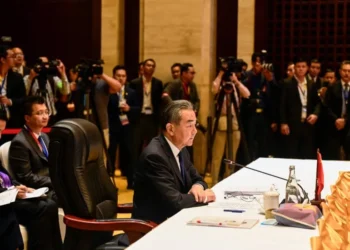Palestinian representatives have presented their arguments on the legal consequences of Israel’s occupation of the West Bank, East Jerusalem and the Gaza Strip.
They argued that the existence and exercise of the Palestinian right to self-determination is not and can never be a matter of negotiation.
The Palestinian representatives also requested the ICJ to declare that Israel’s discriminatory practices against the Palestinian people are tantamount to apartheid.
They also stated that the Israeli occupation was illegal and must be brought to an immediate, unconditional and total end.
Palestinian Foreign Minister, Riyad Al-Maliki presented five maps to the court.
The first one was the map of historic Palestine, the territory, he said, over which the Palestinian people should have been able to exercise their right to self-determination.
The second map showed the 1947 UN Partition Map, which al-Maliki said ignored the will of Palestinians.
The third map showed three-fourths of historic Palestine becoming Israel from 1948 to 1967.
“From the first day of its occupation, Israel started colonising and annexing the land with the aim of making its occupation irreversible. It left us with a collection of disconnected Bantustans preventing the independence of our state as shown in Map 4,” the Foreign Minister continued.
The fifth one was a map presented by Israeli Prime Minister, Benjamin Netanyahu at the UN General Assembly described as “the new Middle East.”
Al-Maliki said of the fifth map, “There is no Palestine at all on this map, only Israel comprised of all the land from the Jordan River to the Mediterranean Sea.”
“This shows you what the prolonged, continuous occupation of Palestine is intended to accomplish: the complete disappearance of Palestine and the destruction of the Palestinian people. There can be no justification for these injustices and these indignities, allowing them to continue is unacceptable and inexcusable.”
Riyad Al-Maliki
Paul Reichler, a legal representative, said the fundamental objective of the occupation is the “permanent acquisition of the maximum amount of Palestinian territory with the minimum number of Palestinians in it.”
Reichler said that it is “crystal clear” that under international law, occupation can only be a temporary state of affairs.
“A permanent occupation is a legal oxymoron,” he asserted.
“What makes Israel’s occupation unlawful is precisely its permanent character,” he added.
Reichler addressed how the U.S shields Israel from legal accountability
Dr. Namira Negm, addressed Israel’s persecution, racial discrimination and apartheid against the Palestinian people
Professor Philippe Sands, also spoke on the violation of the Palestinian people’s right to self-determination
Professor Alain Pellet made a presentation on the consequences of Israel’s breaches
A visibly emotional Riyad Mansour, Palestine’s UN envoy, concluded the arguments by telling the court that a ruling which deemed Israeli occupation illegal and “the legal consequences from this determination” would pave the way “to just and lasting peace”.
The court will meet again tomorrow, Tuesday, February 19, 2024, at 09:00 GMT to hear from South Africa, Algeria, Saudi Arabia, Netherlands, Bangladesh and Belgium.
Israel Calls Case Clear Distortion Of History
Also on Monday, the ICJ published Israel’s written response to the case that is being heard at the court.
The document was signed by Ambassador Modi Ephraim, Israel’s Ambassador to the Netherlands.
In the response, which was submitted on July 24, 2023, Israel argued that any decision or arbitration by the court risks endangering the previously agreed peace process.
Israel claimed that the case represents “a clear distortion of the history and present reality of the Israeli-Palestinian conflict” arguing the court is being asked to “presume Israeli violations of international law.”
It added that the “prejudicial nature of the questions” disregard “thousands of dead and wounded Israelis who have fallen victim to murderous Palestinian acts of hatred and terrorism.”
The response specified that “Israel, as an interested party, has not given its consent to judicial settlement of its dispute with the Palestinian side,” arguing that “both sides, and the international community as a whole, continue to affirm the validity of the terms of reference and established legal framework embodied” in previous agreements, which Israel said “the two sides have agreed to resolve through direct negotiations precisely the subject-matter placed before the court”.
It stated that the case is asking for “an intervention by the Court in a manner manifestly inconsistent with its judicial function and prior pronouncements.”
READ ALSO: ICJ Opens Hearings On Israel’s Occupation Of Palestinian Territories





















